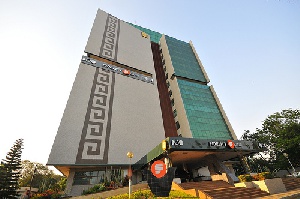One of the indicators of a booming economy is the presence of vibrant home-grown financial institutions and how they contribute to the economy.
There are about 28 universal banks operating in the country, about 24 savings and loans companies, and over 409 micro-finance institutions in the country.
The indigenous banks are expected to support trade and commerce as well as industrialisation by offering financial product and services that are competitive and relevant to needs of the public. However, indigenous financial institutions lack the financial muscle to undertake big-ticket transactions.
Although there are collaborations and mergers coming through lately, as in the case of Fidelity Bank acquiring ProCredit, FNB Bank of South Africa has also recently acquired International Commercial Bank as it looks to tap into the West African market.
However, the Managing Director of HFC Bank Asare Akuffo has asked the Bank of Ghana (BOG) -- the banking sector regulator -- to refrain from any attempt to engineer mergers and acquisitions of banks in the country.
Mr. Akuffo however believes that given the challenging environment the sector is operating in, the regulator should stay off the banks. “Leave them alone. We are doing quite well in a very difficult environment, and this is not time to introduce new policies that will shake up the system,” he said.
“Only a few banks are doing well in terms of profitability. Other banks are just making enough money to satisfy their shareholders. Banks in Ghana cannot generally be said to be too profitable,” he said.
A 2014 PwC Ghana study identified 2013 as one of the toughest years in the country’s banking industry over the past decade. The study found that despite these challenges, total assets grew by 33 percent in 2013 compared to the five-year historic (2008-2012) average growth rate of only 26 percent. There was also a slowdown in deposit mobilisation by the industry in 2013 -- a situation attributable to the poor savings culture of Ghanaians.
The country has over 1.2 million bank account holders out of a population of over 24 million, compared to Nigeria’s 23 million bank accounts holders among a population of 140.
The industry as a whole, the survey found, also came under attack in the customer deposits market -- with the biggest threats posed by government and some non-traditional sources, such as savings and loans companies (S&Ls) and finance houses.
The Bank of Ghana has in the last few years been urging Ghanaian banks to increase their stated capital, and for the national regulator this comes with advantages since it places the local banks in a position to do business in the growing economy.
“Stated capital” refers to the sum of the total proceeds (cash) or value of consideration (non-cash) for every issue of shares and amounts that an institution or a company resolves to transfer to stated capital from surplus.
Dr. Emmanuel Oteng Kumah, Chairman of KEDSS Economics said: “Ghana’s economic growth will be hampered inordinately for a long time if conditions are not germane for the banking sector to play its proper role in financing industry, commerce, agriculture and indeed the public sector as would be necessary, given the dearth of finance in a developing economy like Ghana”.
Mr. Franklin Belnye, Director, Banking Supervision of the BoG said: “Our banks are small, and this limits their capacity to undertake big-ticket transactions and impacts their ability to leverage on economies of scale”.
The Bank Of Ghana, by its licencing policy and guidelines since 2003 as far as Universal Banking is concerned, has replaced the three-pillar banking model -- development, merchant and commercial banking. It has levelled the playing field and opened up the system to competition, product innovation and entry.
Nilla Selormey, Managing Director and Chief Executive Officer of Universal Merchant Bank, has welcomed this move explaining that the industry “will be adequately sized to ensure we can cater for financial needs of the larger economy with the size of projects that are required to support growth and industrialisation. A situation like this will also make for more efficiency and dynamism”.
This notwithstanding, the BOG has been criticised in some quarters for doing little to grow indigenous financial institutions. Indeed, some have even called for a limitation of the growing number of foreign-owned banks in the country.
Ghana’s financial sector is and continues to be dominated by foreign banks that emerged after liberalisation of the financial market over the last eight years. There are about eight local banks as against around 20 foreign-owned banks in the country.
With that not forthcoming, it is time to identify new niches in the market where indigenous banks can play efficiently and still achieve good growth despite the various individual sizes; otherwise, there will still be a need to have or become bigger banks -- and this could well happen by way of forced mergers and acquisitions.
UT Bank has carved a niche for itself as a specialised bank for express trade financing. Fidelity Bank has also pioneered the delivery of banking services to public entities such as the Registrar General’s Department.
Indeed, the acquisition of Procredit by Fidelity Bank -- some have argued -- is a model that indigenous banks must emulate to grow their deposit and customer base to enable them undertake big-ticket transaction.
According to the survey, bank executives who participated are optimistic that the industry is on the brink of a period of significant transformation. They identified four key factors that will drive the biggest transformation in the country’s banking industry over the coming five years.
Competition in the banking sector over the next five years is expected to be driven by existing and potential new-entrant foreign banks, including regional banks.
To have strong home-grown banks in spite of challenges and competition from multinationals, local banks including Ghana Commercial Bank, Agricultural Development Bank, UT Bank, First Capital Plus Bank, Fidelity Bank, and the newest addition, GN Bank, among others need to innovate and introduce new products and services. They can more set themselves apart in this competitive market through such measures.
It has to recognised that banking is no longer about providing a home for the public’s money and giving them access to it when the need be; nor is it just about being a conduit for financing. It is about being a value-adding partner if the bank wants to stay ahead of the game, and that is how an indigenous bank should view itself.
By Eugene Davis
Business News of Saturday, 24 January 2015
Source: B&FT

















